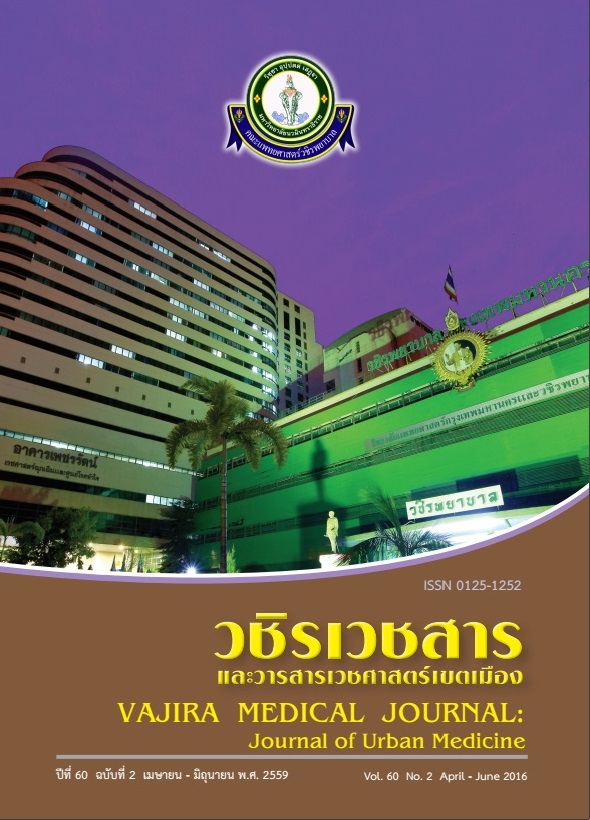A Meta-Analysis of Topical Nasal Antifungal Agents for Chronic Rhinosinusitis
Main Article Content
Abstract
Objectives: To clarify the possible role of topical antifungal agents in the treatment of chronic rhinosinusitis (CRS) by using available up-to-date data.
Methods: We searched the existing evidence in electronic database until September 2014 about the use of topical antifungal agents in the treatment of CRS and its subtypes. We selected only randomized;placebo-controlled trials comparing the use of topical nasal antifungals with placebo, pooled all data and categorized them into different subgroups for meta-analysis. The change of central premise (mean or median) after treatment from individual subgroup was calculated and statistically analyzed.
Results: We included 6 published articles combining all data for statistical analysis. The first outcome measured was the mean change of symptom scores after treatment with amphotericin B (AMB) and placebo, no significant differences (p=0.87) in outcome was observed. Comparison between two treatment groups (AMB vs control) did not show any significant differences in endoscopic scores (p=0.08). There were no significant differences in CT scores between AMB and control group (p=0.43). In addition, the subgroup analysis of comparison between two delivery methods (lavage vs spray) showed no significant differences in symptoms, endoscopic scores, and CT scores (P=0.46, p=0.69, p=0.57, respectively). A meta-analysis of post-treatment with complete symptoms data was not different between active and placebo group (standardized mean differences; SMD=0.43, 95%CI -0.48 - 1.34, p=0.35), nasal endoscopic scores data found no different between two patient groups(SMD=0.18, 95%CI -0.08 - 0.44, p=0.18), and complete CT scores data showed no different in both medication groups (SMD=0.31, 95%CI -0.79 - 1.42, p=0.58)
Conclusion: The role of intranasal antifungals agent in the treatment of CRS is still debatable due to the diversion of results in the literatures. This meta-analysis did not show any benefit in regard to symptoms, nasal endoscopic scores or complete CT scores. The future prospective studies are needed to investigate the efficacy of this treatment.
Downloads
Article Details
References
2. Settipane GA. Epidemiology of nasal polyps. Allergy Asthma Proc. 1996;17:231-6.
3. Ponikau JU, Sherris DA, Kern EB, H omburger HA, Frigas E, Gaffey TA, et al. The diagnosis and incidence of allergic fungal sinusitis. Mayo Clin Proc. 1999;74:877-84.
4. Wei JL, Kita H, Sherris DA. The chemotactic behavior of eosinophils in patients with chronic rhinosinusitis. Laryngoscope. 2003;113:303-6.
5. Weschta M, Rimek D, Formanek M, Polzehl D, Podbielski A, Riechelmann H. Topical antifungal treatment of chronic rhinosinusitis with nasal polyps: a randomized, double-blind clinical trial. J Allergy Clin Immunol. 2004;113:1122-8.
6. Ponikau JU, Sherris DA, Weaver A. Treatment of chronic rhinosinusitis with intranasal amphotericin B: a randomized, placebocontrolled, double-blind pilot trial. J Allergy Clin Immunol. 2005;115:125-31.
7. Ebbens FA, Scadding GK, Badia L, Hellings PW, Jorissen M, Mullol J, et al. Amphotericin B nasal lavages: not a solution for patients with chronic rhinosinusitis. J Allergy Clin Immunol. 2006;118:1149-56.
8. Liang KL, Su MC, Shiao JY, Tseng HC, Hsin CH, Lin JF, et al. Amphotericin B irrigation for the treatment of chronic rhinosinusitis without nasal polyps: a randomized, placebo-controlled, double-blind study. Am J Rhinol. 2008;22:52-8.
9. Gerlinger I, Fittler A, Fonai F, Patzkó A, Mayer A, Botz L. Postoperative application of amphotericin B nasal spray in chronic rhinosinusitis with nasal polyposis, with a review of the antifungal therapy. Eur Arch Otorhinolaryngol. 2009;266:847-55.
10. Hashemi SM, Mokhtarinejad F, Karim M. Does amphotericin B nasal douching help prevent polyp recurrence following functional endoscopic sinus surgery? J Res Med Sci. 2011;16:74-8.
11. Weschta M, Rimek D, Formanek M, Podbielski A, Riechelmann H. Effect of nasal antifungal therapy on nasal cell activation markers in chronic rhinosinusitis. Arch Otolaryngol Head Neck Surg. 2006;132:743-7.
12. Ebbens FA, Georgalas C, Luiten S, van Drunen CM, Badia L, Scadding GK, et al. The effect of topical amphotericin B on inflammatory markers in patients with chronic rhinosinusitis: a multicenter randomized controlled study. Laryngoscope. 2009;119:401-8.
13. Fokkens WJ, Lund VJ, Mullol J, Bachert C, Alobid I, Baroody F, et al. EPOS 2012: European position paper on rhinosinusitis and nasal polyps 2012. A summary for otorhinolaryngologists. Rhinology. 2012;50:1-12.
14. Fokkens W, Lund V, Mullol J. European position paper on rhinosinusitis and nasal polyps 2007. Rhinol Suppl. 2007:1-136.
15. Orlandi RR, Marple BF. The role of fungus in chronic rhinosinusitis. Otolaryngol Clin North Am. 2010;43:531-7, viii.
16. Marple BF. Allergic fungal rhinosinusitis: current theories and management strategies. Laryngoscope. 2001;111:1006-19.
17. Rupa V, Jacob M, Mathews MS, Seshadri MS. A prospective, randomised, placebo-controlled trial of postoperative oral steroid in allergic fungal sinusitis. Eur Arch Otorhinolaryngol. 2010;267:233-8.
18. Ferguson BJ. Categorization of eosinophilic chronic rhinosinusitis. Curr Opin Otolaryngol Head Neck Surg. 2004;12:237-42.
19. Morpeth JF, Rupp NT, Dolen WK. Fungal sinusitis: an update. Ann Allergy Asthma Immunol. 1996;76:128-39; quiz 39-40.
20. Kuhn FA, Javer AR. Allergic fungal rhinosinusitis: our experience. Arch Otolaryngol Head Neck Surg. 1998;124:1179-80.
21. Andes D, Proctor R, Bush RK. Report of successful prolonged antifungal therapy for refractory allergic fungal sinusitis. Clin Infect Dis. 2000;31:202-4.
22. Seiberling K, Wormald PJ. The role of itraconazole in recalcitrant fungal sinusitis. Am J Rhinol Allergy. 2009;23:303-6.
23. Steel HC, Tintinger GR, Anderson R. Comparison of the anti-inflammatory activities of imidazole antimycotics in relation to molecular structure. Chem Biol Drug Des. 2008;72:225-8.
24. Thanasumpun T, Batra PS. Oral antifungal therapy for chronic rhinosinusitis and its subtypes: a systematic review. Int Forum Allergy Rhinol. 2011;1:382-9.
25. Sacks PL, Harvey RJ, Rimmer J, Gallagher RM, Sacks R. Topical and systemic antifungal therapy for the symptomatic treatment of chronic rhinosinusitis. Cochrane Database Syst Rev. 2011:CD008263.
26. Snidvongs K, Chaowanapanja P, Aeumjaturapat S, Chusakul S, Praweswararat P. Does nasal irrigation enter paranasal sinuses in chronic rhinosinusitis? Am J Rhinol. 2008;22:483-6.
27. Stankiewicz JA, Musgrave BK, Scianna JM. Nasal amphotericin irrigation in chronic rhinosinusitis. Curr Opin Otolaryngol Head Neck Surg. 2008;16:44-6.
28. Sutton AJ, Duval SJ, Tweedie RL, Abrams KR, Jones DR. Empirical assessment of effect of publication bias on meta-analyses. BMJ. 2000;320:1574-7.


